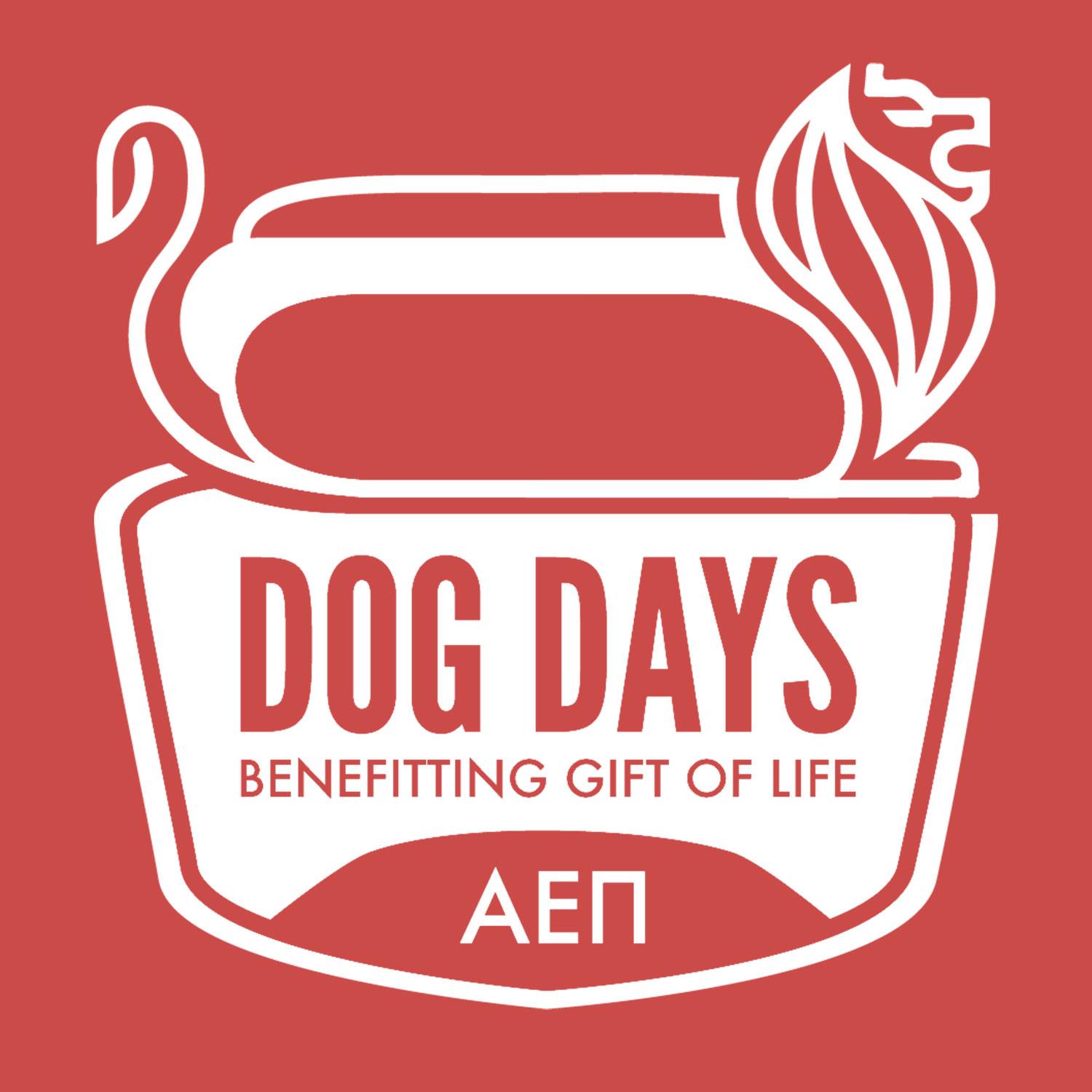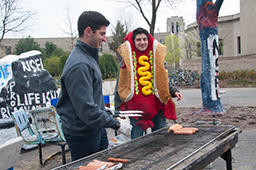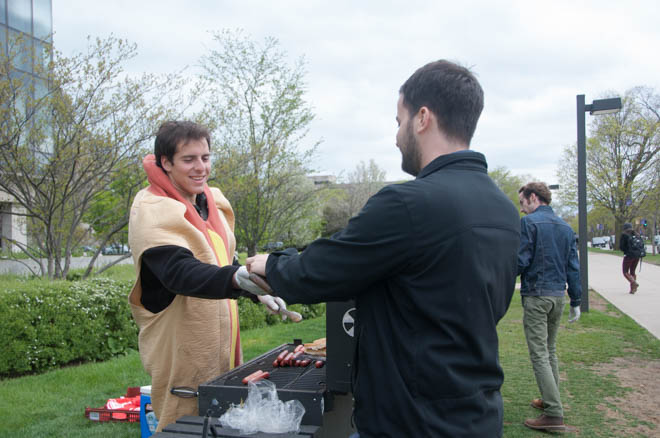You’ve heard the chants. You’ve liked the profile pictures. You’ve smelled the smoke from the grill. You’ve seen the frat boys running around in hot dog suits.
You know we’re in the midst of Dog Days.
But did you know how much this week-long philanthropy event has changed and grown since its early days (and its early promo videos)?
Breaking records to cure cancer
Last year, according to their website, the Tau Delta chapter of Alpha Epsilon Pi Fraternity at Northwestern sold 6,500 hot dogs to raise a record-breaking $32,053 for the Gift of Life Foundation. Gift of Life is a national nonprofit dedicated to curing cancers like leukemia and lymphoma by helping children and adults find bone marrow transplants. This year, AEPi is aiming to surpass that amount. If Dog Days 2016 reaches its goal of $35,000, their website said, then they will have raised enough money “to provide for 580 new potential bone marrow donors.”
According to their website, over the past 14 years, Dog Days has raised over $150,000 for charities such as the American Cancer Society, Sharesharet and the Gift of Life.
And it all started with one grill outside of the AEPi house for one day, said Weinberg sophomore and President of AEPi Tau Delta, Adam Shimer.
Ch-ch-ch-changes
Now, they sell everything from bagel dogs to sodas, and even Andy’s frozen custard. According to Shimer, a lot of the food is donated by companies, including Sodexo, which contributed 1,500 dogs, 2,000 buns and 480 drinks this year. Since 2012, after increasing their sponsor base, Dog Days stations have popped up all across campus—at the Rock, Kellogg, Ford and Lisa’s. Basically, you can’t walk down Sheridan without being yelled at to buy a two-dollar hot dog while this song plays in the background.
Since the introduction of Dogs After Dark last year, AEPi brothers grill day and night, rain or shine. Also last year, Shimer said, they started late night deliveries from 10 p.m. to 2 a.m., which “significantly increased sales.” According to Shimer, they make a good amount of money through absurdly large orders by residential halls and organizations – this year, both Zeta Beta Tau Fraternity and Bobb-McCulloch Hall ordered over 250 dogs. Another initiative that has allowed AEPi to raise more money for charity is the use of Venmo, a payment app that they began accepting in 2014 in addition to cash and credit, Shimer said.
But AEPi has also had to jump through some new hoops because of Dog Days’ exponential growth.
“Due to the size of our event,” Shimer said, “we happily complied to a number of new health code rules. Something new we are doing this year is keeping hourly temperature logs of the grills at every station to ensure that they are staying warm enough to cook the dogs thoroughly.”
Why so successful?
So how has Dog Days become so successful over the past 14 years?
Basically, it’s impossible to miss.

With the constant stream of philanthropy events on campus, you’ve seen your fair share of promotional Facebook photos. But what makes Dog Days stand out from the rest of them is the sheer volume. Not only do all the brothers change their profile pictures and cover photos, but they also get their friends to do so through various forms of coercion and bribery, creating a newsfeed full of those distinctive red squares and links to their Facebook event and online order form.
In addition to this social media takeover, AEPi brothers are masters of publicity on the street. That means harassing anyone who passes by, especially during busy times between classes, calling you out for refusing to buy a hot dog (even if you’re holding one in your hand that you just bought from down the street), donning giant wiener costumes and screaming “Dog Days!” very loudly outside of Bobb-McCulloch Hall at 1 a.m.

According to Shimer, AEPi also encourages competition in order to raise as much money as possible. During Student Group Day and Greek Day, the organization that spends the most money gets 10% of the day’s profits, leading to some of the most profitable days of the week.
Despite this competitive aspect, both AEPi brothers and other members of the Northwestern community appreciate how Dog Days brings people together.
“So many people come up to me during the week to tell me how much they love Dog Days and how many hot dogs they have already eaten,” Shimer said. “The excitement and support of the thousands of customers that we serve really helps to keep us motivated and energized.”

“Dog Days is one of the only campus philanthropies I believe in,” said self-proclaimed “hot-dog princess,” Weinberg junior Kati Krchnavy. “Hot dogs are a unifying force. What’s better than cheap, accessible hot dogs?”
According to Krchnavy, she received a letter last year because AEPi thought that she had contributed a generous charitable donation, when in reality she had actually just ordered $30 worth of hot dogs for her and her friends.
Although she is clearly an avid lover of Dog Days, Krchnavy still thinks the event could improve.
“I don’t like it when they don’t sell past 5 p.m.,” Krchnavy said, “because that’s like primo dinner dog time. But absence makes the heart grow fonder, I guess.”
Already a nationally renowned and popular philanthropy event on campus, Dog Days just keeps getting bigger and bigger, with new additions and adjustments every year. Who knows how much AEPi and their wieners will raise for charity in the future?